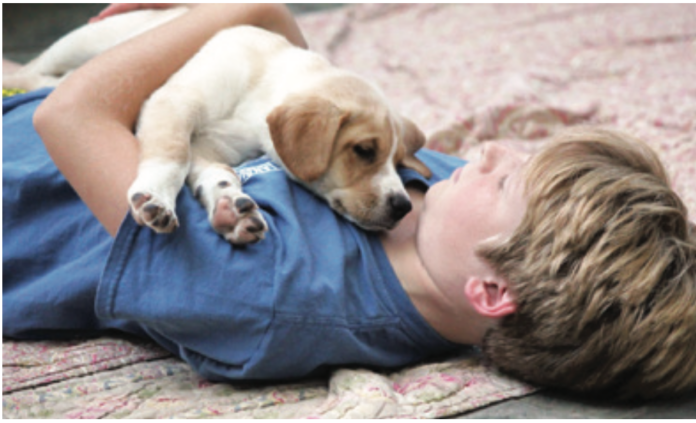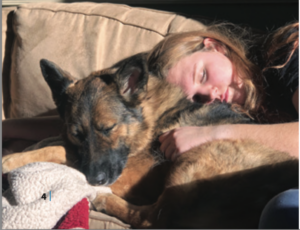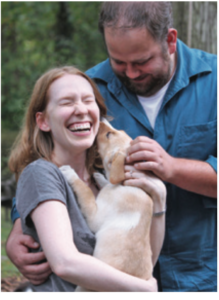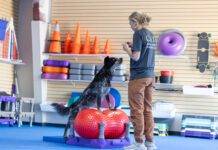
When I learn that someone is interested in one of my foster puppies, I know what they’re picturing: A tiny, miraculous little ball of fur, curled up sound asleep in their lap. The family is gathered ’round. The house feels so cozy. Nobody’s looking at a screen, and nobody wants to be anywhere but here.
Those half-hours do happen with a puppy! And I would love for the potential adopter to experience them. It’s just that I want to be sure that the would-be new puppy owner knows there are 47 other half-hours in each puppy day – and some of them can be of a much less blissful nature.
If you’re thinking about adopting a puppy, here’s my question to you: Is puppyhood, in all its intensity, right for you, right now?
Are You Ready for a Puppy?
The appeal of a waggy, cuddly eight-week-old puppy is obvious – so obvious, in fact, that I spend a great deal of time trying to talk people out of a puppy. That may seem a strange angle for a person who has fostered 200 rescue puppies, but for everyone’s sake, I’m in search of a good match.
When chatting with potential adopters, I try to help them discern whether their expectations of puppyhood are realistic and gauge their readiness level. I answer any questions they may have about puppy care – and I compare that to the experience of adopting an adult dog.
There are three possible outcomes to that conversation, all good ones:
1. The humans reveal how much they really do know about living with a puppy, and it’s clear that they’re actually ready.
2. The humans recalibrate, and then, after adjusting their expectations, decide they truly are ready for a puppy.
3. The humans recalibrate and exclaim, “What in the name of all that is holy were we thinking?” They decide to adopt an adult dog, instead.
Every one of those outcomes results in a better, happier transition for the puppy! (And of course, for the humans.)
Self-Exam for Determining If You’re Ready for a Puppy
Since I can’t conduct that conversation in person with you – usually I’d do this as you are covered in puppies and becoming dangerously smitten with my latest foster litter – we’ll just conduct yours here in these pages.
Before we start, understand this: There are no right or wrong answers to these questions. People have surprised me again and again. Folks I thought were slam dunks with what seemed an ideal set-up (big fenced yard, plenty of time and money) have been overwhelmed by their puppy, and folks to whom I handed a pup over with some trepidation (recent college grad, working full time and living alone in an apartment) have ended up hitting it out of the park. So, these days, instead of attempting to do the sizing up myself, I just suggest folks talk through these questions, and afterward the right answer seems to surface.
Ask yourselves:
- How many hours of the day is somebody at home?
- Is the person at home the most the same person who is excited about caring for a puppy?
- What’s the plan for when nobody will be home for two hours or more?
- Picture a typical day in your home. Think about where the puppy would be and what the puppy would be doing, hour by hour. Don’t visualize a movie puppy who is sound asleep every time that’s convenient for the story. Add some jumping, tinkling, barking, chewing, and pooping to that vision.
- Now picture a more challenging time in your home (a business trip, a soccer tournament, a remodeling project, hosting Thanksgiving) and think about how that would play out with a little puppy to manage.
- Do you have a “village” – friends and neighbors who might be able to cover for you at times? If not, can you afford to hire pet-sitters?
- How do you feel about taking your puppy outside to potty almost every half hour, from 7 a.m. to 11 p.m., for the first few weeks?
- If that sounds pretty terrible, then how does a puppy who’s not really potty trained yet at 6 months sound to you? (Sorry. Just trying to help.)
- How good can your household be about keeping a pup in a contained area, and putting things out of puppy’s reach?
- If not so good, then how relaxed can you be about household damage (ruined carpets, gnawed furniture, chewed shoes)?
- Is someone in your household excited about training? Is someone looking forward to helping the puppy learn (through patient everyday teaching) how to live peaceably in the human world?
If this list has you wavering just a bit – good! You’re on your way to a more solid decision, either way.
Consider Adopting an Adult Dog

Here’s a key bit of information that may have eluded you amid the puppy frenzy: There are wonderful adult dogs who won’t tinkle on your carpet. Not even once! In fact, they may be happy to lie around all day while you’re working, never chew a thing, and welcome you home with a nice wag.
Sounds nice, eh? That will not happen with a puppy.
There is a whole universe of beyond-puppyhood dogs out there, from adolescents just past the peeing-and-chewing stage, to sweet old-timers just looking for a couch for their twilight years. There are rescues and purebreds – and rescue purebreds – of all ages. Honestly, sometimes other people are better equipped to socialize and train a puppy than you are, and you can get very lucky having their dog land in your lap months or years later.
Now that you think about it, maybe an older dog sounds good after all, right? Except that you’re worried you and the dog won’t be as bonded if you miss the puppyhood stage together. Well, “BWA-HAHAHA,” say all of us who’ve had any number of adult dogs join our families.
Then there’s the concern that an adult dog will come with problems. Sure. Could be. None of us is perfect, right? But – unless you are lucky and a perfect trainer – your supposedly blank-slate puppy (no such thing, really, what with genes and all) will likely have and/or develop some behaviors that you have to work through, too.
One thing I have seen way too many times is the person who got an 8-week-old puppy because they wanted, at all costs, to avoid having a problematic dog – and then they ended up creating a dog with problematic behaviors because they didn’t have the interest and patience required to nurture and train a puppy.
Just to wrap up this older-dog option: If the intensity of true puppyhood feels like a poor match for your life right now, how great that you can consider skipping that chapter entirely and jumping ahead in the story with an older dog! Maybe there will be a point later on where your circumstances are better suited to meeting the challenges of puppyhood, and your by-then wonderfully settled dog will then help you welcome an 8-week-old to the family.
Choosing a Puppy After All? Go All In

Maybe, though, you’re ready. Maybe you looked at that bullet-point list of questions and winced a bit at first, realizing that this means you can’t go to Lisa’s for Thanksgiving after all and that you’re going to have to give up that fun softball league for a while. But after thinking through the implications, you came to the delightful conclusion that you feel more than ready to back-burner everything else.
In that case, now I don’t have to hold back about the benefits of adopting a puppy. Only after I’m sure you’ve considered the downsides can I tell you my secret: While I’m theoretically prioritizing the puppy instead of my own needs for a while, it turns out that puppyhood-done-right grounds me in my happiest day-to-day life. Here’s why:
- Suddenly, hanging out at home doing “not much” earns you a gold star instead of a guilt trip! Why? Because now, when you are just sitting on the couch snuggling with your puppy, gazing into her eyes, singing her a little song about how cute she is, what you’re doing is not categorized as wasting time, procrastinating, or being lazy. You are, in fact, doing the most important work you could be doing right at that moment: building your puppy’s bond with you. How swell is that?
- Overnight, 90% of your conversations become about dogs, which feels about right to me.
- Socializing a puppy is an amazing excuse to have your favorite people over, and all you have to do is provide the puppy!
- You’re outside every half hour in the beginning and for longer periods once the pup can go on big walks. Life is better with more fresh air, sunshine, and trees.
- There’s now a totally legit reason to skip those big shindigs you rather dreaded.
- It’s your job to give your puppy a great introduction to the wider world, and part of that is facilitating nice meetings with strangers. That means, even if you’re normally an introvert, for the sake of your puppy you’re going to have a bunch of chats with new folks on your walks. At worst, it is surprisingly lovely; at best it transforms your view of the world.
It turns out that once you temporarily back-burner part of your life to make way for the puppy, your front burner starts to overflow with things that – in addition to being critical for puppy raising – can bring you happier days, a more relaxed psyche, and a more hopeful window on the world. One of the unexpected outcomes of puppyhood can be a permanent re-arrangement of the burners.
As you embark on this adventure, know that the very same puppy can create two extremes of an experience. The difference is in the human mindset. You can choose to take a deep breath and love this. You know what happens then?
That tiny, miraculous little ball of fur is curled up, sound asleep in your lap. The family is gathered ’round. The house suddenly feels so cozy. Nobody’s looking at a screen, and nobody wants to be anywhere but here.
Let’s do this.





Thank you for this clarifying (& humorous) piece, Kathy. After taking the test honestly I am able to see what I need & want to do.